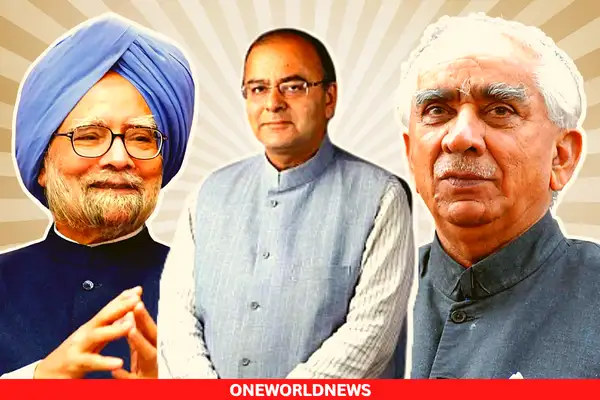Undeniable! 6 Financial Ministers who shaped India’s economy

Let’s take a look at the six most effective finance ministers in contemporary India
From Manmohan Singh to Jaswant Singh, here is the list of 6 Financial Ministers Who Shaped India’s Economy and proved their mettle.
1. Manmohan Singh
Manmohan Singh is undoubtedly the best finance minister of the modern world as he opened doors for foreign investments through LPG policy. He became the finance minister in 1991 under the PM Narasimha Rao government.
The economic liberalisation package announced by Manmohan Singh and PM Rao opened the nation to FDI and reduced the red tape that had previously slowed business growth. The finance minister who later became Prime Minister for two consecutive terms reduced the peak import duty to 50 per cent from 300.
2. Arun Jaitley
Arun Jaitley had made a significant contribution to the government for more than two decades, During his career, he was one of the most significant strategists. Jaitley was seen as a key player during the BJP Government as he took several key economic initiatives like demonetisation and the implementation of the Goods and Services Tax (GST).
The merger of the Railway budget with the general budget and introduction of the Insolvency and Bankruptcy Code, He also introduced Insolvency and Bankruptcy Code to resolve the issues with companies that were turning insolvent. He was one of the rare politicians with good relations even with the opposition leaders. Jaitley often helped BJP in bringing together the opposition to form a coalition government when needed.
3. Yashwant Sinha
Yashwant Sinha became the Finance Minister following subsequent political developments and presented the interim budget for 1991-1992.
Yashwant Sinha got the Finance portfolio after the General Elections in March 1998 in the first-ever BJP-led Government under the leadership of Atal Bihari Vajpayee. Sinha presented the final and interim budgets for 1998-99. He became the Minister of Finance again after the 13th General Elections in 1999 when BJP came into power. Yashwant Sinha is credited to rationalize the exercise and reduce the slab to 1 from 11.
4. P Chidambaram
Another senior leader of Congress P Chidambaram was given the key portfolio of Finance in the Union Cabinet. The final budget for 1996-97 was presented by P Chidambaram. Although his first term was a short-lived one it showed Chidambaram’s competence in handling the finance of the country. This helped him become a full-time finance minister under the tenure of PM Manmohan Singh in 2004. He remained finance minister till 2014 except for three and a half years when he was given Home Ministry.
5. Pranab Mukherjee
Pranab Mukherjee, the former President held finance portfolios between January 1982 and December 1984 during Indira Gandhi’s tenure as PM and again between January 2009 and June 2012 during Manmohan Singh’s tenure as PM. One of the biggest highlights of Pranab Mukherjee’s term as FM was the retrospective tax. Pranab Mukherjee while announcing Budget 2012-13 proposed to amend the Income-Tax Act, 1961 as a retrospective effect to tax- Vodafone-type acquisition and merger deals done in foreign lands that involve domestic assets.
6. Jaswant Singh
Jaswant Singh served as Minister of Finance in the Union Cabinet in the short-lived government of Atal Bihari Vajpayee between May 16, 1996, to June 1, 1996. Singh became the finance minister again in July 2002 switching posts to Yashwant Sinha. He served as Finance Minister of the country until the defeat of the NDA in May 2004 and was instrumental in pushing through and defining the market-friendly reforms of the government.
Do you know any other finance minister who has made some major financial decisions during his career that profited India globally?
Please feel free to share with us.







